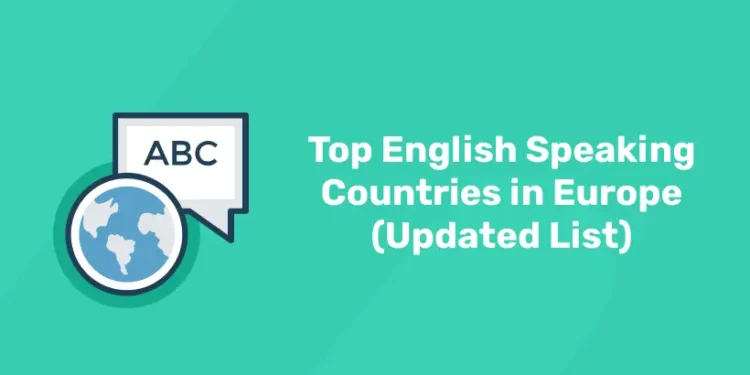Table of Contents
English has become broadly spoken language in Europe. Europeans are proud of their language, but since English is now required in the workplace, many are studying it as a second language. English is a useful language for foreign business owners that want to grow throughout Europe. Internet surfers also speak English rather frequently. Both the number of English speakers in European nations and the emergence of a new kind called Euro English are expected. In this article, we’ll have a look at the top English-speaking countries in Europe, search into their environments, educational opportunities, and cultural variations. If you’re a language passioner seeking immersion or a student looking to pursue great career, these countries offer unparalleled experiences for English speakers from around the globe.
Crack IELTS Exam With Online Coaching – Enrol Now!
Introduction
Every European region has a designated official language. However, English is one of the key languages because of Europe’s significant global involvement in offering international professional possibilities and education to people worldwide. Europe is home to a large number of English Speaking Countries. Ireland and the United Kingdom speak English as their first language.
The official languages of Gibraltar, Jersey, Guernsey, Isle of Man, Malta, and the Sovereign Base Areas of Akrotiri and Dhekelia are English. Ninety percent of Dutch people speak English, which has official status as a regional language in the Netherlands. In other EU nations, such as Spain, Portugal, or Luxembourg, the majority of speakers of English are foreigners who have studied it as a second language. In addition, the EU, Scotland, Wales, and Northern Ireland all recognise it as their official language. Among the top English Speaking Countries in Europe are Belgium, Denmark, Norway, Sweden, and Finland. In Germany, 62% of people speak English, and 61% of people in Belgium do too.
Benefits of Migrating to English Speaking Countries
The easiest and fastest approach to learn English is to enroll in study abroad programmes and begin speaking the language. You’ll have plenty of opportunities to use English in daily contexts as you’ll be surrounded by it. You will get acquainted with various dialects, slang terms, and popular culture whilst studying overseas.
- Language Proficiency: Experiencing life in an English-speaking setting provides exceptional chances to improve language proficiency. Interactions on a daily basis, such as placing food orders or striking up discussions with locals, offer fluency and real-world experience.
- Education: The world-class educational institutions found in many English-speaking nations are well-known and honored. Students can study language classes or academic degrees in everything from science careers to literature.
- Career Opportunities: English proficiency is becoming more and more valuable in the global labour market. Speaking and writing English well provides access to a greater variety of job opportunities in a variety of industries, both locally and globally.
- Cultural Exchange: People who live in English-speaking nations are exposed to a variety of cultures, customs, and viewpoints. Interacting with residents and taking part in neighborhood gatherings and enhances individual development.
- Networking: Making relationships with individuals from various professions and backgrounds might result in beneficial networking opportunities.
- Traveling: Since English is a language that is widely spoken throughout the world, it is easier for visitors to get around and converse in new places. Traveling to English-speaking nations makes interactions with locals and other travelers easier and makes for more enjoyable travel experiences.
- Life Quality: English-speaking nations frequently have excellent healthcare systems, a wide range of leisure activities, and good living standards.
- Personal Development: Relocating abroad to an English-speaking nation requires people to push themselves beyond their comfort zones. These encounters foster independence, self-assurance, and personal development.
Crack IELTS Exam With Online Coaching – Enrol Now!
List of Top English Speaking Countries in Europe
With a population of nearly 71 million, the European Anglosphere is made up of the United Kingdom and the Republic of Ireland. Only 13% of EU nationals speak English as their first language, compared to 38% of people who can speak it locally. European English is spoken by almost half of the population.
| EF EPI Ranking (from 113 countries) | Countries |
| 1 | Netherlands |
| 3 | Austria |
| 4 | Denmark |
| 5 | Norway |
| 6 | Sweden |
| 7 | Belgium |
| 8 | Portugal |
| 9 | Germany |
| 11 | Croatia |
| 12 | Greece |
| 13 | Poland |
| 14 | Finland |
| 15 | Romania |
| 16 | Bulgaria |
| 17 | Hungary |
1. UK
English speakers can be found in large numbers in England (United Kingdom), an anglosphere with the well-known capital city of London. English is the native tongue of 98.3% of people in the UK. In the United Kingdom, there are around 60 million anglophones. The United Kingdom is the largest English-speaking nation in Europe. English is also spoken in Wales, Scotland, and Northern Ireland, the three countries that make up Britain.
Related : How to Migrate to UK from India
2. The Netherlands
In The Netherlands, over 90% of people speak English. Approximately 71.45% of the population speaks English fluently and natively. The primary reason for this is the linguistic similarity between Dutch and English. Out of all the major EU countries, the Dutch speak more English than any other nation, except Sweden. The rise in the English-speaking population in Amsterdam and other locations is also attributed to immigration, tourism, and foreign commerce. Dutch speakers are more fluent in English than speakers of German and French.
3. Sweden
In 2016, Sweden was the country with the most English-speaking citizens in Europe. Now that 89% of the population speaks English in the nation, it is in third place. Sweden’s capital, Stockholm, is highly valuable commercially. The populace may eventually retake the top place and speak English like the locals. In Sweden, about 70% of people speak English very well. The biggest percentage of English speakers in Europe is found in Sweden, where it makes up over 16% of the total population. In schools, English is taught as a foreign language and is treated as a second language.
4. Denmark
The next-best English-speaking nation in Europe is Denmark. Eighty-six percent of residents in this country in Scandinavia speak English. English speakers can find good employment prospects in Denmark. In Denmark, there are approximately 5 million English speakers. The percentage of Danes who speak English well is over 69%. Denmark’s capital city is Copenhagen.
Crack IELTS Exam With Online Coaching – Enrol Now!
5. Norway
Norway’s official language is Norwegian. Their second language is English. Nearly 90% of people are able to communicate in English because to the 4.5 million English speakers. In Norway, the percentage of persons who speak English well is around 67%. Oslo, the nation’s capital, offers a plethora of English-speaking career opportunities.
6. Ireland
In terms of the proportion of English speakers in Europe, Ireland is the second-largest English-speaking nation. In Ireland, about 98% of people speak English. The introduction of universal state education in the national schools in 1831 served as justification for the adoption of English. Over time, Irish was linked to poverty while English became a language of prestige. After that, the Irish language began to fade, but later in the 1920s, it became required in government and educational institutions. Although Irish is their mother tongue, many of them are now proficient in English. Many English writers were born in Dublin, the capital city of the Republic of Ireland. To study in Ireland, pass the IELTS exam by enrolling Entri’s IELTS training course.
Also Read : How to Migrate to Ireland from India
7. Belgium
With a score of 620, Belgium is ranked #6 out of 112 nations in the EF EPI rankings. Belgium is ranked fifth in Europe and has an extremely high proficiency index. Approximately 61% of the 10 million individuals speak English fluently. Belgian official languages are German, Dutch, and French. Many work prospects for English speakers worldwide have emerged in Brussels.
8. Austria
Austria is now ranked among the top English-speaking countries in Europe. German is the official language of Austria, but since it borders eight other countries, people there also speak languages like Croatian, Slovenian, and Hungarian. They are nevertheless rather proficient in English. Their population speaks English as a second language to 73% of people. Austria has an EF EPI score of 628 and is ranked #2 out of 112 countries in the EF ranking. English is primarily utilised for social, academic, and professional purposes in Austria. An abundance of English-speaking tourists visit Vienna each year. In Austria, women tend to speak English more fluently than males.
9. Poland
Poland’s capital, Warsaw, is important for business process, IT, and research and development outsourcing. Poland is a popular destination for immigrants seeking employment. Similarly, Poles relocate overseas in quest of employment. Their primary use of the English language was for commerce. As a result, more people in Poland are using English. Approximately 62% of the 37 million people can speak English. The native tongue of Poles is Polish. There are numerous dialects in it. Polish is becoming more and more popular in the UK as more and more of them visit there. The Polish-German border regions are where most people speak English.
10. Finland
Finland is a country in Northern Europe that is home to about 5.5 million people. Over 70% of adults are proficient in spoken English. The majority of them live in Helsinki. English is commonly spoken in Finland, despite the official languages being Finnish and Swedish. In 2021, Helsinki Mayor Juhana Vartiainen suggested becoming English Finland’s official language. Universities provide a wide range of degree programmes that are taught in English. Finland is ranked #9 for English proficiency with an EF EPI score of 618. Finland offers chances for English teachers in schools and is a fairly cosmopolitan country.
11. Germany
Germany has more than 62.35% English speakers, making it the most English-speaking nation in Europe. Germans are able to control their firms in the European market because of this English stronghold. In Germany, English is widely used in business, and there are plenty of English-speaking employment available. Germans are becoming more and more fluent in English due to their ability to understand the language. Berlin is the city with the largest English-speaking population. Universities in Germany also offer a large number of courses taught in English.
Related : How to Move to Germany
European Countries with English as Official Language
Cyprus
Cyprus is an Anglophone nation in Europe, with Nicosia serving as its capital. English is spoken by 73% of Cypriots. Their official languages are both Turkish and Greek. The average pay in the country is higher, and there is less rivalry at work. It is a fantastic choice for English-speaking expats because to the pleasant temperature, better healthcare, and low crime rate. Cyprus boasts inexpensive housing expenses and a high standard of living. The majority of people in Cyprus’ Sovereign Base Areas speak English. The large number of British visitors, the migrant Cypriot populations in the UK and Australia, and the British military presence in Cyprus are the main causes of the increased usage of the English language. English was the official language of Cyprus until 1960.
Gibraltar
Among the top English-speaking nations in Europe, the country is a British overseas territory. Its rich cultural legacy makes it a desirable travel destination. English is the native tongue of all Gibraltarians. Due to Gibraltar’s close proximity to Spain, many of its citizens are now bilingual and speak Spanish. This Mediterranean nation attracts a large number of foreign visitors because of its high GDP per capita, low unemployment rate, and strong employee growth.
Malta
Country Malta is a tiny EU nation, with Valletta serving as its capital. The Malta spoke Latin and Italian before the British arrived. After 1868, the island became a nation speaking English in Europe. Maltese is the name of their own language. Malta offers affordable housing and a laid-back way of life. Travellers may take advantage of the vibrant nightlife, rich culture, stunning coastline, and diving experiences. EU nationals and foreigners can simply complete the necessary legal papers to reside in Malta. English is the native tongue of 89% of Malta’s population.
Entri App: Best Online course for IELTS
Entri App’s IELTS course is unique since it offers a whole study bundle that will help you get a high band score. Our course offers IELTS candidates a distinctive and reasonably priced learning experience, with more than 100 study materials, sample notes, live, one-on-one, and group interactive sessions with our expert mentor, recorded sessions, weekly assessments, and remote learning possibilities.
Courses Offered
Take our academic version of the IELTS if you want to study overseas. Alternatively, our general IELTS course is ideal if you’re looking for a job or permanent residence.
- General IELTS
- Academic IELTS
Course Overview
- 30 Days Mentorship
- Exam Packs – Reading Practice
- PDF Course materials
- 6 Months Recorded Videos Validity
- Live Exams and Special Exams
- Recorded Video Classes on App
- Guidance & Recorded Videos for IELTS: Receive Mentorship
Crack IELTS Exam With Online Coaching – Enrol Now!
FAQs
Q. Which country in Europe speaks English the most?
Ans:
- united kingdom.
- The Netherlands.
- Sweden.
- Denmark.
- Norway.
- Ireland.
- Belgium.
- Austria.
Q. What are the top 5 most English speaking countries?
Ans: The majority of native speakers in a number of nations and territories are English speakers. Among these, the United States, the United Kingdom, Canada, Australia, and New Zealand are the five largest and are together referred to as the “core Anglosphere”.
Q. Is Poland an English speaking country?
Ans: Yes, however it changes according to the situation. Although Polish is Poland’s official language, English is commonly spoken and understood in the country’s largest cities and popular tourist locations. English is really the most often used second language in Poland, where 30% of people speak it as a foreign language.
Q. Which country has best English accent?
Ans: The two most recognisable English accent types in the world are probably British and American. They both have a type of “general” accent, which is seen as more sophisticated or proper than the other variations, as though speaking without an accent were a sign of social standing.










